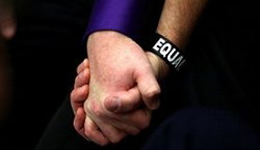LGBT Health Awareness Week Highlights Holes in Idaho’s Healthcare System
March 26, 2012 Leave a comment
While organizations, clinics and healthcare systems across the country are hosting events and programs targeting the LGBT community this week, here in Idaho, National LGBT Health Awareness Week serves as a solemn reminder that there are still large areas of the country where the health care needs of a gay or transgender person are often ignored, forgotten, or under-served at best.
The cost of healthcare aside, the task of finding a physician that not only welcomes but understands the needs of a gay or transgender patient can seem overwhelming, especially in rural areas where a town may only have one doctor or where the nearest clinic maybe miles a way.
Sadly, even in heavily populated areas like Boise, many physicians and nurse practitioners aren’t trained to deal with the specific needs of their LGBT clients.
A few years ago a friend went to an emergency room at a Boise hospital after breaking out in some sort of itchy bumps covering most of his body, including his pubic region.
The friend told the doctor he was gay. He also explained that the bumps seemed to appear after he had spent an evening sitting in a friends hot tub.
The doctor took a quick look at the bumps and in less than two minutes later wrote up a prescription for Valtrex, the herpes medication.
My friend was horrified.
“We are seeing a lot of it, especially in young gay men,” the doctor told him.
Lucky, a few days later my friend scheduled an appointment with a dermatologist in order to get a second opinion. The second doctor quickly dismissed the herpes diagnosis and, after a quick test, found that the bumps were indeed caused by a bad case of “hot tub folliculitis.”
The doctor told him to throw away the expensive Valtrex medication and instead prescribed him an oral antibiotic, which cleared up the condition in less than a week.
“I will never tell another doctor about my sexual orientation again, ” my friend said later, “I suspect that had I not have told him that I was gay, he would have performed a proper examination rather than making a false diagnosis.”
A year or so ago, another friend started to ask his physician about some pain he was feeling during anal sex with his partner. The doctor, who he had been seeing for more than three years or so for routine exams, cut him off with an astonishing,” I don’t want to hear about your sex life.”
While there have been no real studies to speak of regarding the LGBT community’s access to healthcare in Idaho, it’s probably safe to say that the above anecdotes aren’t isolated cases.
More than one transgender person living in Idaho has reported having to educate their own physician about their own health needs, that is if the physician is willing to see them at all.
A quick search of the Gay and Lesbian Medical Association website finds only two providers listed in Idaho. Dr. Marvin Alviso serves as a family practitioner specializing in HIV and AIDS in Boise and Dr. Cynthia Bunde specializes in women’s health at the Women’s Health Clinic in Pocatello.
While certainly not a comprehensive directory for physicians who accept and or meet the needs of LGBT patients in Idaho, the GLMA website does paint a somewhat bleak picture for Idahoans who turn to the internet in order to find a physician.
All is not lost though, even here in Idaho there are a number of great physicians who do except and treat LGBT clients.
So how does one go about finding a good doctor?
One neighboring state’s Public Health Department suggests the following:
Ask others. Friends and colleagues are a great resource when you are looking for a health care provider. Ask people you know who their provider is and what he or she is like. Ask friends what they like and value about their providers. It can be especially helpful to ask other GLBT people for referrals.
Interview potential health care providers. Once you have a list of potential providers (make sure that your insurance is accepted, if you have it), you may choose to set up visits with several of them in their offices. Let them know you are looking for a health care provider, and would like to briefly meet and talk with them. Ask if this interview can be free, and ask how much time you will have with the provider.
The website also suggests that LGBT clients ask the following questions:
What is your experience working with gay, lesbian, bisexual and transgender patients?
What training have your staff have on LGBT issues?
Who takes backup calls when you are on vacation? Are they experienced with LGBT patients?
Do you maintain a list of LGBT friendly providers to whom you refer ? (A terrific primary provider still might refer you to a homophobic cardiologist or endocrinologist.)
How will you maintain patient confidentiality? (This may be especially important if you are a minor and you aren’t “out” to your parent/guardian.)
Are you willing to work with my other providers? (This is important if you decide to work with alternative health care providers such as naturopaths or acupuncturists.)
What do you think your patients appreciate most about you?
Providers themselves can help make a huge difference in the health of Idaho’s LGBT community by listing with sites like the GLMA, advertising with LGBT friendly websites and publications and by partnering with groups that focus on serving the health needs of the community.
Having a booth at pride events, partnering with HIV testing and prevention groups like Allies Linked for the Prevention of HIV and AIDS, or by getting involved in local community centers or LGBT programs are all great ways to get the word out that you are willing to serve LGBT patients.
Mental healthcare is another important area in which many LGBT individuals struggle to find the right provider. Due to lack of training, understanding, religious intolerance or blatant homophobia more than one LGBT client has been permanently emotionally and mentally scarred by the diagnosis and therapy of their so-called mental health “expert.”
Luckily, there seems to be a larger portion of mental health providers in Idaho willing to let potential LGBT clients know that they are available to meet their needs.
While important, a LGBT individual’s health goes far beyond simply getting tested for HIV every three months to six months. There are many specific needs, questions and concerns not faced by our straight counterparts.
If you don’t already have one, why not set aside some time this week to ask around and find a personal physician? While you are at it, this might also be a good week to get an HIV test, hit the gym, seek out a spiritual family or focus on that diet change as well. It’s also a good week to preview the Affordable Healthcare Act and learn how it will affect you. Remember, there is only one you and you owe it to yourself to make sure you’re in good health!




